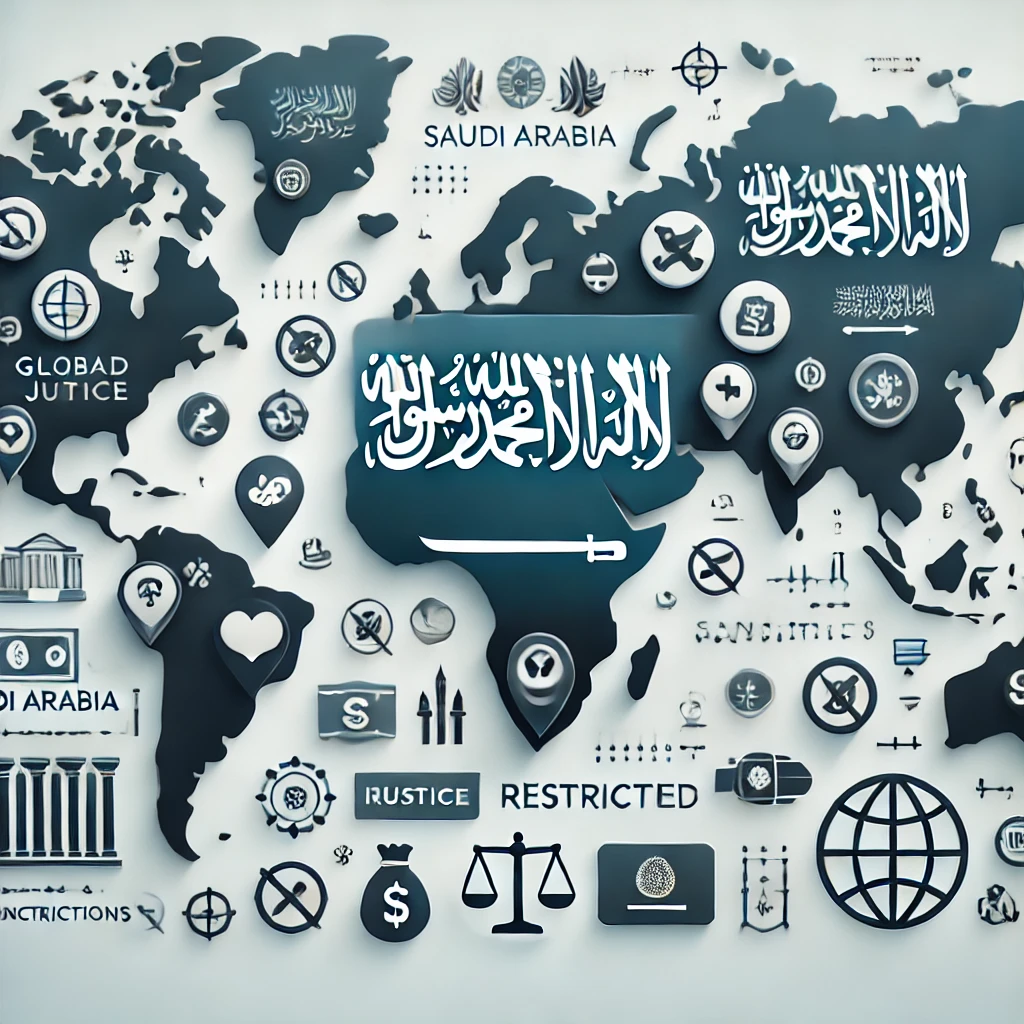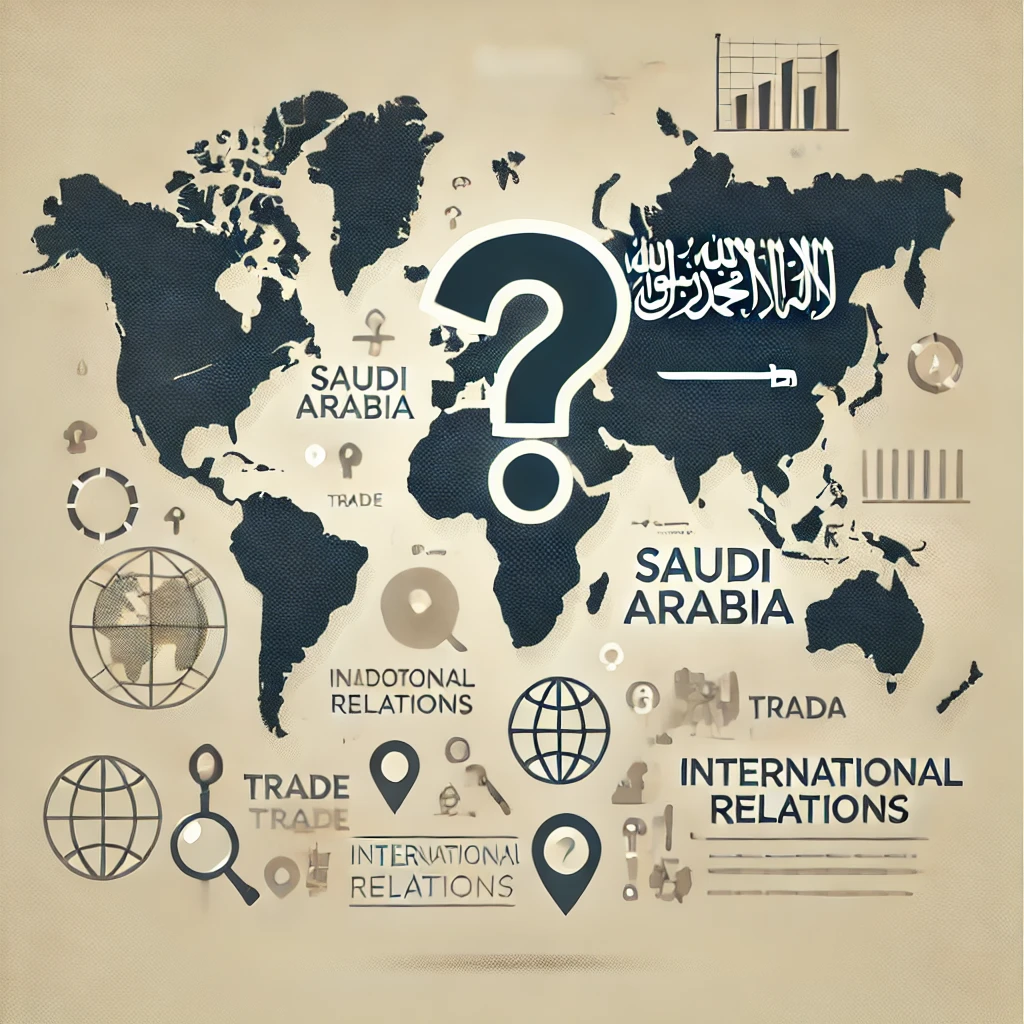
Saudi Arabia Sanctions
Sanctions imposed on Saudi Arabia may significantly affect the activities of both international corporations and individual entrepreneurs. Our law firm has deep expertise in sanctions law and provides a full range of services for companies and individuals facing such restrictions.
OFAC License Attorney will help understand how sanctions can affect your business and provide recommendations for compliance. We create effective internal control systems to minimize the risk of violating sanction requirements. Consultations, development of compliance programs, legal protection, and transaction analysis – we provide comprehensive services for the security of your business.

Why Sanctions Were Imposed on Saudi Arabia?

One of the most high-profile reasons that caused a serious resonance and contributed to the imposition of sanctions was the murder of prominent journalist Jamal Khashoggi on October 2, 2018, in the Saudi Arabian consulate in Istanbul. He was a notable figure in the world of journalism and political analysis, known for his criticism of Saudi authorities’ policies.
The murder of Jamal Khashoggi became a turning point in relations with Saudi Arabia. Khashoggi had long been close to the Saudi elite, but his open criticism of the regime’s repression forced him to leave the country and seek refuge in the United States. However, on October 2, 2018, after entering the Saudi Arabian consulate in Istanbul, he did not come out alive. It was a meticulously planned and cold-blooded operation. This tragic incident caused international outrage, prompted investigations, and sparked criticism of the Saudi authorities.
Additional U.S. sanctions were imposed in response to Saudi Arabia’s military actions in Yemen, which resulted in significant civilian casualties. Saudi Arabia’s geopolitical disagreements with a number of countries, its role in regional conflicts, and support for various political groups also contribute to the intensification of sanction pressure.
Types of Sanctions on Saudi Arabia
In recent years, the United States and some other countries have introduced a number of sanctions against Saudi Arabia, covering several key areas and aimed at combating human rights violations, repression of dissidents, corruption, and other unlawful actions.
The main legal basis for these restrictive measures applied by the United States was Presidential Executive Order No. 13818, signed in December 2017. It allows American authorities to freeze assets, impose financial and visa restrictions, and prohibit entry into the country for individuals involved in gross human rights violations or corruption schemes—both domestically and abroad.
Let us take a closer look at the main categories of sanctions applied to Saudi Arabia:
Economic Sanctions
This is the most common type of sanctions applied. They are aimed at restricting or prohibiting trade, investments, and any other financial operations with the country. The main goal of economic sanctions is to exert pressure on the state by limiting its access to necessary goods, services, and technologies.
According to section 1(a)(i-iii) of E.O. 13818, all assets and property interests of individuals and legal entities involved in human rights violations or corruption are subject to freezing. This includes not only direct participation in such actions but also material support, provision of goods or services, or any other assistance that facilitates illegal activities.
Economic sanctions are applied to those who assist, sponsor, and support individuals involved in human rights violations or corruption. Such measures have a global scope. They are applicable to any individual or legal entity under U.S. jurisdiction. Companies and private individuals engaged in international business activities must closely monitor their counterparties and business partners to avoid becoming targets of secondary sanctions.
Such measures reduce investment attractiveness, complicate financial operations, and lead to reputational risks for the companies and individuals involved.
Arms Embargoes
The arms embargo is another crucial element of the sanctions regime. The embargo applies to the export and transfer of weapons categorized under Category III: ammunition/equipment (22 C.F.R. § 121.1); Category IV: launch vehicles, guided missiles, ballistic missiles, rockets, torpedoes, bombs, and mines (22 C.F.R. § 121.1); Category VII: tanks and military vehicles (22 C.F.R. § 121.1); Category VIII: aircraft and related equipment (22 C.F.R. § 121.1).
Moreover, the restriction also applies to defense services: training, technical support, modernization, and the transfer of technologies related to these categories of armaments (22 C.F.R. § 120.9),
An embargo is being imposed to restrict the export of weapons, military equipment, and dual-use technologies to Saudi Arabia. These restrictions are related to concerns about the use of arms against civilians or in conflicts causing humanitarian crises.
Result: a reduction in the ability to acquire new military equipment and weapons, complications in the modernization of the country’s military potential, an increase in dependence on partners.
Travel Bans
The travel ban to the United States applies to individuals involved in serious human rights violations. According to Section 2 of E.O. 13818, entry into the U.S. for such individuals is suspended (including immigrants and non-immigrants). These measures are intended to prevent human rights violators from seeking refuge in the U.S. or using American resources for their purposes (E.O. 13818, December 20, 2017, Sec. 2).
Moreover, the ban on entry to the United States may be extended if a person is suspected of involvement in corruption or other illegal activities. This ban includes not only denial of entry but also the cancellation of previously issued visas, making it a powerful tool for exerting pressure on officials violating international norms.
Visa restrictions and entry bans to the United States are imposed on individuals who, in the opinion of American authorities, are involved in serious human rights violations or corruption. Executive Order 13818 grants U.S. government agencies the authority to deny visas and access to the country’s territory to such individuals.
As a result, isolation on an international scale. Individuals under sanctions find it difficult to conduct business, participate in international events, or use the financial infrastructure of the United States.
Asset Freezes
Freezing assets is a powerful tool for exerting pressure on individuals and legal entities associated with violations. The purpose of this type of sanction is to block access to assets that could be used to finance activities deemed unacceptable by the international community.
According to paragraph 1(a) of Executive Order No. 13818, all assets of individuals and legal entities subject to sanctions, including bank accounts, real estate, and other property rights, are subject to freezing. These assets are blocked within the territory of the United States and in American financial institutions, making their use or transfer impossible (E.O. 13818, Section 1(a)(ii)(A-D)).
This mechanism not only complicates the business operations of sanctioned individuals and organizations but also hinders their access to global financial markets, as many international transactions go through American banks.
The result is the inability to conduct normal financial activities. Blocked funds cannot be used for investments, operations, and payment for services. It is also worth noting the loss of trust from partners. A business with frozen assets becomes less attractive to investors and counterparties.
OFAC General License
The sanctions regime established by the Office of Foreign Assets Control raises questions and concerns among companies and individuals conducting business or planning cooperation with this country. Despite strict restrictions, OFAC provides the opportunity to obtain a General License or, if necessary, a Specific License for certain types of activities.
OFAC General License — it is a kind of “permission” that allows carrying out certain actions within the framework of restrictive measures without the need to obtain individual approval for each operation. It usually covers the following areas:
- Humanitarian aid: delivery of food, medicine, and essential items for the population of Saudi Arabia, work of non-governmental organizations in the field of assistance to refugees or vulnerable groups;
- Educational programs: student exchange, scientific cooperation between universities, internship and professional development programs;
- Healthcare: projects in the field of medical infrastructure, equipment supply, provision of medicines;
- Internet services and communication: providing certain communication services to support freedom of speech and information exchange.

Sometimes the activity you plan to conduct with Saudi Arabia does not fall under the existing general licenses. In such a case, it is necessary to obtain a special license. To obtain it, you need to prepare a package of the following documents:
- Detailed description of the deal, project, or planned operations in Saudi Arabia. Specify the participants of the deal, ultimate beneficiaries, financial schemes, volumes of supplies or investments;
- Contracts, invoices, agreements, letters from partners, and other financial materials confirming the reality of the transaction and the legality of its economic basis. If it concerns investments, specify the sources of financing and the routes of money transfers;
- Inquiries about the reputation of partners and their registration. Conduct screening of the contractors participating in the project and ensure that they are not in SDN List.
On the Ministry of Finance website, a form for submitting a Specific License is usually available, or you can use the electronic portal. Provide accurate contact information and attach all documents confirming the nature and purposes of the activity.
Your statement must contain clear wording, avoid vague descriptions and gaps in reasoning. Conciseness and specificity increase the chances of your application being reviewed without additional requests.
If you are unsure about correctly filling out the form or completing the documentation, contact attorneys experienced with OFAC. Specialists will help you avoid technical and legal errors that could result in a denial or delays in processing.
The processing time for the application depends on the complexity of the project, the workload of the department, and the completeness of the submitted documents. On average, the procedure can take from several weeks to several months.
Our team of lawyers has extensive experience working with OFAC, capable of simplifying and expediting the licensing process. We will conduct a detailed audit of your activities, develop a strategy, and prepare a document package in compliance with all regulatory requirements, as well as provide compliance support after obtaining the license. This way, you will meet all OFAC conditions and be able to avoid potential sanctions.
Penalties for Saudi Arabia Sanctions Breaches
Non-compliance or violation of the sanctions regime can lead to serious consequences for both individuals and companies.
Large financial penalties. Violators may face fines reaching hundreds of thousands or even millions of dollars. The amount depends on the severity and systematic nature of the violations. Companies that violate sanctions are subject to even higher fines, which can reach hundreds of millions of dollars, especially when it comes to large corporations. Additional sanctions are possible, such as a ban on operations in the U.S. or inclusion in the “blacklist.”
Confiscation of assets. The USA, through OFAC, can block bank accounts and other assets associated with individuals or organizations violating sanctions. Any transactions may be deemed illegal and halted, leading to significant financial losses.
Criminal liability. In particularly severe cases, criminal prosecution and imprisonment may be threatened. Violation of the sanctions regime can negatively affect the reputation of companies and individuals, complicate obtaining licenses, contracts, and investments.
International companies and financial institutions strive to avoid the risks of cooperating with sanctions violators to prevent themselves from coming under scrutiny or damaging their reputation. Banks and other financial organizations may refuse lending, insurance, and other services to those violating the sanctions regime. Organizations once caught circumventing sanctions may come under close monitoring by government agencies and be subjected to regular audits.
OFAC Saudi Arabia Sanctions Lawyers
The sanctions imposed against Saudi Arabia may become a serious problem for companies and individuals whose activities are connected with this country. If you are faced with the need to obtain an OFAC license or encounter difficulties with the sanctions regime, our experienced lawyers are ready to help.
Our specialists offer clients the following services:
- Collection of documents and justification of the request for obtaining an OFAC license;
- Analysis of business processes and supply chains to identify areas with an increased risk of sanctions regime violations;
- Development of an internal control policy that ensures compliance of transactions and financial operations with OFAC requirements;
- Representation of clients in case of disputes or investigations by OFAC;
- Negotiating with government authorities to reduce the risks of financial losses and reputational damage;
- Assessment of counterparties, contracts, and financing schemes considering the current sanctions regime.
Our lawyers specialize in sanctions law, have successful experience working with OFAC and other U.S. regulatory authorities. We understand the specifics of interacting with American authorities and help clients successfully overcome bureaucratic barriers.
We accompany clients at all stages — from the initial consultation and transaction analysis to obtaining an OFAC license and resolving potential disputes. In addition to Saudi Arabia, we also provide services on sanctions issues in Iran, Cuba, Russia, Ukraine and other countries.
Compliance with sanctions legislation is the key to financial stability and reputational security. Our attorneys help avoid large fines, asset freezes, and criminal liability associated with violations of the sanctions regime.
If your business is connected with Saudi Arabia, you want to obtain an OFAC license or understand possible restrictions, we are ready to provide qualified support. Contact us right now to ensure your business complies with sanctions legislation, avoid the risks of financial losses and reputational damage. We are prepared to offer a comprehensive solution and highly professional legal support at all stages of interaction with OFAC.




